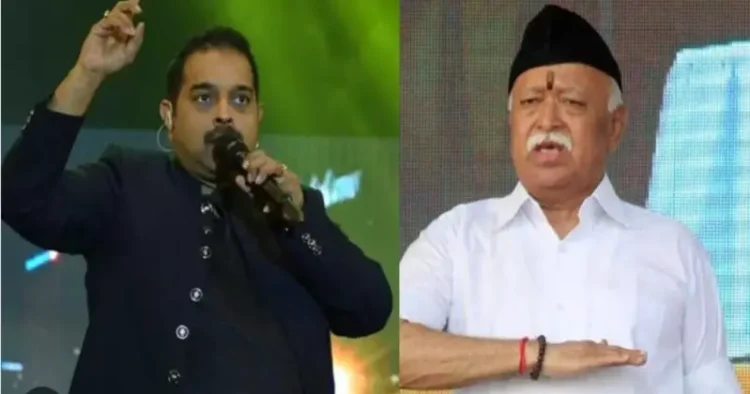RSS Sarsanghchalak Dr Mohan Bhagwat, engaged in an in-depth discussion with the music maestro Shankar Mahadevan regarding the musical nuances of the composition of RSS’s prayer. Bhagwat expressed a strong desire for Indian music to gain prominence in composition and was particularly keen on the integration of Indian ragas, emphasising a departure from the Western musical influences that have characterised many marching tunes.
The RSS prayer, known as ‘Namaste Sada Vatsale Matrubhumi,’ was first conceptualised during an all-India meeting in Sindhi, near Wardha. In 1939, the broad outlines of this prayer were outlined. The stanzas of the prayer, written in Sanskrit, are attributed to the teacher Narhari Narayan Bhide. It was first sung by senior RSS functionary Yadavrao Joshi in Pune in the year 1940. Joshi later went on to hold the position of Sah Sahkaryavaha (Additional General Secretary) within the RSS organisation. Comprising 13 stanzas, the prayer holds a special place in RSS events and is a staple at daily shakhas.
Shankar Mahadevan’s meeting with Dr Mohan Bhagwat underscored the importance of infusing Indian musical heritage into compositions. Mahadevan explained that Dr Bhagwat, an accomplished musician himself, advocated for the use of Indian ragas instead of Western musical motifs in such works. Dr Bhagwat’s vision seeks to tap into the rich treasure trove of Indian ragas, making marching tunes uniquely Indian in character.
Shankar Mahadevan’s role as the chief guest at the Vijayadashami function marks a remarkable milestone. He is the first musician in over a decade to receive this distinction, a testament to his musical prowess and cultural significance. RSS has a tradition of inviting distinguished personalities from various walks of life as chief guests at their events. Last year’s guest was mountaineer Santosh Yadav, who made history as the first woman to be invited as the chief guest in recent years.
This development reflects the RSS’s commitment to celebrating Indian culture and music while reaching out to a broader, global audience. Shankar Mahadevan’s musical expertise and creative vision promise to make this prayer a masterpiece that resonates with people worldwide.



















Comments